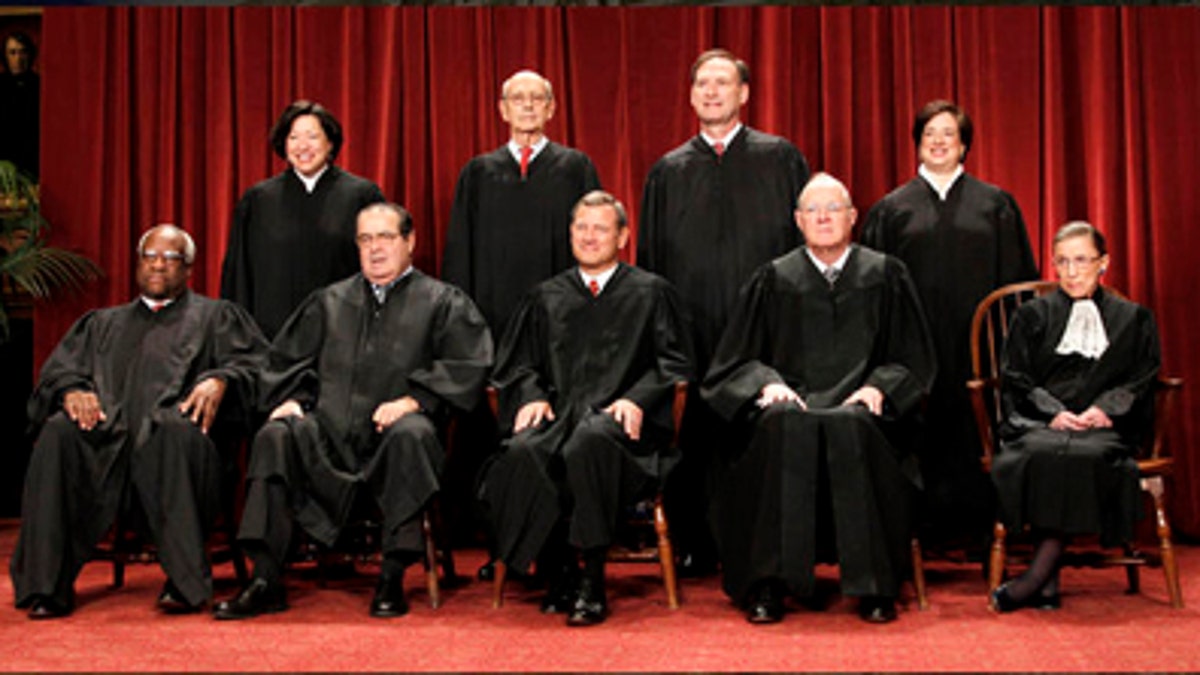
FILE: In this Oct. 8, 2010, file photo, members of the Supreme Court gather for a group portrait at the Supreme Court in Washington. Seated from left are: Associate Justices Clarence Thomas, Antonin Scalia, Chief Justice John Roberts, Associate Justices Anthony M. Kennedy, and Ruth Bader Ginsburg. Standing, from left are: Associate Justices Sonia Sotomayor, Stephen Breyer, Samuel Alito Jr., and Elena Kagan. (AP)
WASHINGTON -- The Supreme Court hasn't even agreed yet to take the case questioning the constitutionality of the individual mandate -- the centerpiece of President Obama's health care law -- but already arguments are lined up to remove justices from trying to weigh in on deliberations.
Justice Elena Kagan's role in the Obama administration as it was formulating the legal defense for the health care law disqualifies her from participating in the decision, say groups who call the former solicitor general incapable of being objective. Kagan says she was not involved in developing the legal strategy of the Affordable Care Act, but opponents of the law have requested records of the administration's deliberation process to see who participated.
Conversely, liberal groups and some Democrats in Congress say Justice Clarence Thomas can't be jurisprudent because his wife worked for organizations that actively opposed the health care law. On Thursday, 20 House Democrats requested a federal investigation into whether Thomas broke federal disclosure laws by not listing his wife's pay on a disclosure form for 21 years -- even though her job at the time was no secret.
"The forms are simple and straightforward. Given that we now know he correctly completed them in at least five earlier years, it's hardly plausible -- indeed it's close to unbelievable -- that Justice Thomas did not understand the instructions," said Common Cause President Bob Edgar.
On Thursday, the Obama administration requested the court take up the case and deliver its verdict by June 2012, as Obama and his Republican opponent gear up for the fall campaign. That request got the backing of retired Supreme Court Justice John Paul Stevens, suggesting that the court could be inclined to take it.
Twenty-six states and the National Federation of Independent Business would be opposing party to the case.
Tom Dupree, a former Justice Department official in the George W. Bush administration, said the justices will likely decide in the next few months when and whether it will hear the case, but a lot of combined factors "make it a pretty difficult invitation for the Supreme Court to turn down."
"You have a case that presents very important constitutional questions arising from the administration's signature domestic initiative and now you have both the states that are challenging the law as well as the administration itself telling the Supreme Court you need to decide this issue now," Dupree told Fox News.
If it does take the case, pressure to sit it out will be especially acute on Kagan and Thomas, and possibly Justice Antonin Scalia, who spoke to a Tea Party group about potential weaknesses in the law last year.
No mechanism exists to force a justice to sit out a case, though Kagan sat out 28 cases in her first year on the court last year because of her prior work as the Obama administration's top Supreme Court lawyer.
This October, she has already announced she will be absent from one case, regarding Congress' power to give copyright protection to works by foreign composers, directors and other artists, among them Sergei Prokofiev's "Peter and the Wolf," that long have been in the public domain.
But calling it a "humongously important case," Dupree said he doesn't think any justice will will decline to participate.
"Absolutely not," he told Fox News. "There's a good possibility it could be decided by a one-vote margin, and in that circumstance, where you have folks lining up on both sides of the political aisle trying to get whatever advantage they can, it doesn't surprise me that there are calls for recusal. But I think at the end of the day, Kagan and Thomas are both deciding this case."
Texas attorney general Greg Abbott, whose state is one of the parties in the suit, said the calls for recusal are "very predictable whenever you're dealing with a case of this magnitude."
But he projected that "when it's all said and done, all nine justices on the court will participate in the case."
Abbott added that the decision will likely come down to a 5-4 ruling, meaning only Justice Anthony Kennedy, who was appointed by President Ronald Reagan, will be the swing vote.
"Here's the very important thing," he said. "Twice in the past 16 years, Justice Kennedy has voted to strike down and act of Congress as going beyond the limit of the Commerce Clause. That is the legal theory upon which the states rest their claim. If Justice Kennedy votes again saying that Congress exceeded their authority on the Commerce Clause, I think that should prove a victory for the states in our challenge against Obamacare."












































